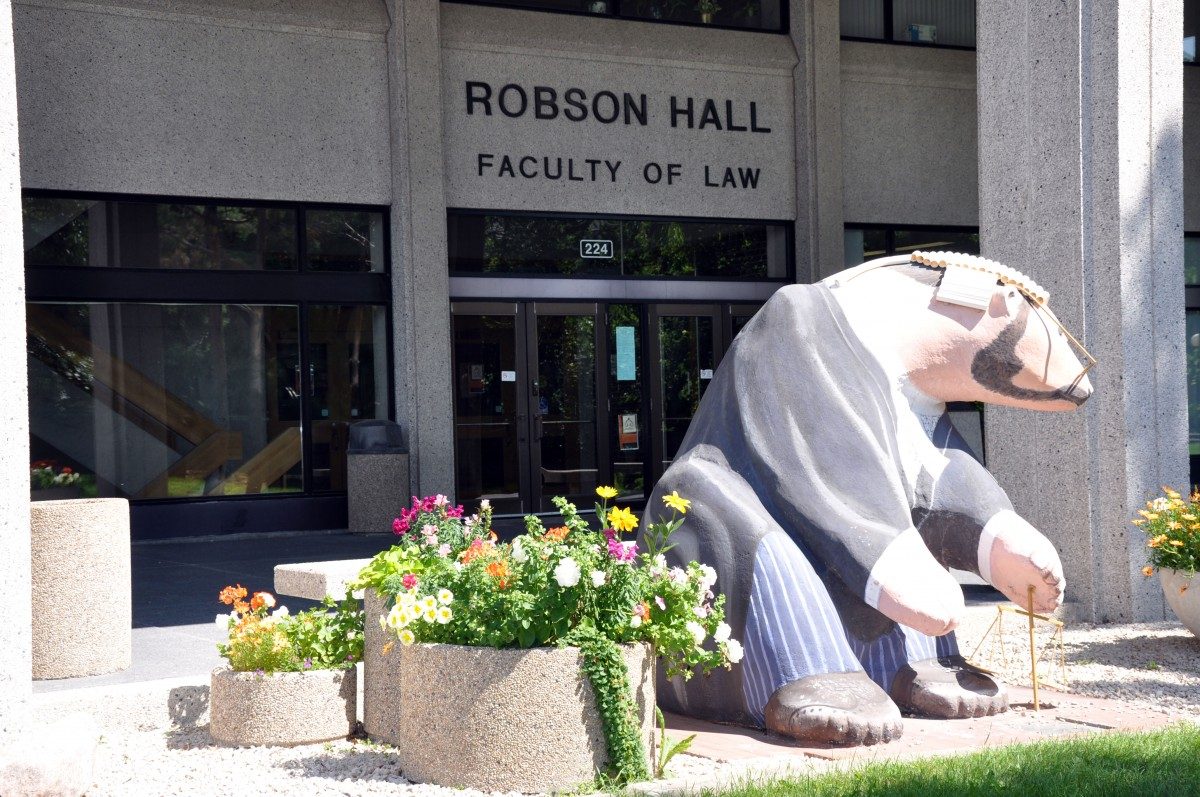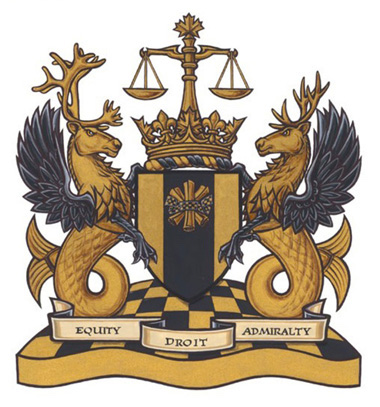
Robson Hall welcomes the Federal Court of Canada
Federal Court hearing in Faculty of Law exposes students to unique learning
Robson Hall will host the Federal Court of Canada on Wednesday, October 10, 2018. The Federal Court will sit and hear a real case in the Faculty of Law’s Moot Courtroom. Hearings of this nature are open to the public, with doors opening at 10:00 a.m. After the hearing, the presiding judge will hold a question and answer session. Wednesday’s hearing will consider an application for judicial review of a decision made by the Immigration and Refugee Board of Canada that rejected a claim for protection under the United Nations’ Convention Relating to the Status of Refugees.

Federal Court of Canada Crest
When approached by the Federal Court of Canada, Dr. Jonathan Black-Branch, Dean of the Faculty of Law, had indicated he would be happy to host a hearing and was pleased when the opportunity arose. Dean Black-Branch, stated “I am especially pleased to welcome Madam Justice McVeigh to Robson Hall. This is a very exciting opportunity for our Faculty to host such a prestigious court hearing and I wish to thank the Federal Court for assisting to make this happen. Moreover, I am particularly pleased for the learning opportunity that this represents for our students. This is an excellent chance for all law students, faculty members, and members of the legal community at large both to experience such a hearing as well as to have the opportunity to ask the judge questions afterwards. In addition, I am pleased that counsel will return to Robson Hall, one, an alumnus, and the other, a former lecturer. ”
Wednesday’s hearing will very much be a Robson Hall and University of Manitoba community event, with counsel for the applicant being Nobel Prize-nominated international human rights lawyer Mr. David Matas, who both developed the Immigration and Refugee Law course that he taught for decades at Robson Hall, and who received a Distinguished Alumni Award from the University of Manitoba in 2014. Counsel for the Respondent (the Crown), is an alumnus of Robson Hall, Mr. Brendan Friesen, who graduated with his LL.B. in 2009, and articled for the Department of Justice Canada, 2009 – 2010.
Counsel for the parties involved don’t seem to object to the change from the usual downtown Winnipeg hearings. Friesen expects the experience of arguing a Federal Court application in his old student Moot Courtroom lecture hall to be “a bit surreal. It’s a unique privilege to be able to argue a case in a place that holds so many good memories for me,” he said. “I feel a strong connection to my alma mater, and there’s a significance to this experience that I’m sure I won’t fully appreciate until sometime in the future.”
That said, he notes that, “it’s just another day in court. I’ve had the good fortune to appear in all levels of court across a variety of jurisdictions during my career, so it’s common for me to argue a case in a new or unusual environment. I’m looking forward to absorbing all that the day has to bring.”
Depsite his vast teaching experience at Robson Hall, Matas, will present in the Moot Courtroom for the first time. He expects the hearing to differ from the downtown Winnipeg experience because while the Court is open to the public, “typically no one shows up downtown. Having an audience is different from having no audience,” he said, adding that when there is a large crowd listening in on the proceedings, “Counsel find themselves being more formal and watching what they say more.” That said, he added, “It’s always a pleasure to come to Robson Hall.”
As a student here, Friesen said while he hadn’t planned to practice in the area of immigration law and didn’t take the course that Matas was teaching at the time, he did, “discover a strong interest in administrative law.” Coming from an undergraduate background in international conflict and development, Friesen said, “I had the good fortune of doing a university-supported 4-month internship in India while a student at Robson Hall.” This inspired him to seek out internationally-focused work at the Department of Justice, which led him to immigration law. “I quickly came to appreciate the academic nature of immigration law,” he said, “and I find the stories and diversity of people who are engaged with Canada’s immigration system to be fascinating. While I may not have planned to work in this area, I can’t imagine doing anything else now.”
For current law students considering future careers in the field, Matas observes that while there is definitely a need for immigration lawyers now, it is a need reflecting the effects of the current US administration, which he cautions may not last. From an administrative law perspective, however, Friesen hopes that students attending the hearing willabsorb as much as possible: “keep an open mind and take in every aspect of the hearing,” he said. “I always encourage our articling students to get into court to witness different styles of advocacy and the differences in how judges preside over matters. The same goes for law students…. Seeing different advocacy styles, seeing how lawyers interact with the court, seeing the procedural realities of a hearing are all extremely useful to develop one’s own skills.”
Matas noted thatwhile law students will have read a lot of judgements as part of their studies, seeing an actual hearing means, “you see how the sausage is made.”
Likewise, Friesen said, “I’m also glad that students get to see the Federal Court in action. Most of my practice is in the Federal Court, yet I had no exposure to that court during law school.”
“This opportunity advances clinical learning for our students as we implement our recent curriculum changes, at which experiential learning is at the forefront,” said Dean Black-Branch. “It is a wonderful chance for our students and Faculty to see advocacy first-hand as well as to discuss the proceedings with Madam Justice McVeigh.”
Please note: all persons entering the courtroom will be admitted subject to hand-held wand security screening. No food, beverages, backpacks or bags will be permitted in the courtroom. No audio or video recordings are permitted, but audience members may take notes on paper or laptops.






